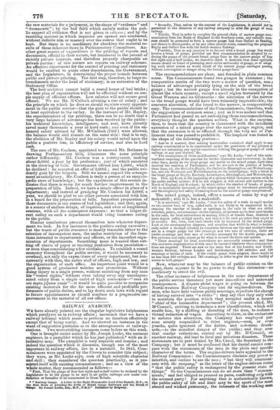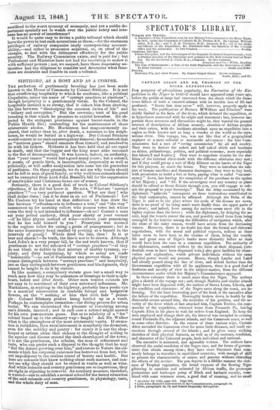RAILWAY ANARCHY.
WE have already pointed out the singular legislative helplessness which paralyzes us in railway affairs; that we have a railway tribunal which seems to perform no function effectively except that of being costly. And we showed an instance in the want of suggestive guidance as to the arrangements at railway- stations. Two more striking instances come before us this week. One is brought under notice by Mr. Joseph Locke, the eminent engineer, in a pamphlet which he has just published,* with an il- lustrative map. The pamphlet is very readable and concise ; and indeed the question which it discusses, though one of the most i important in railway affairs, lies in a nutshell. In 1845, Com- missioners were appointed by the Crown to consider this subject; they were, as Mr. Locke says, men of high scientific character and skill ; they considered the question practically, as it pre- sented itself with existing circumstances ; and on a view of the whole matter, they recommended as follows- " rust, That the gauge of four feet eight-and-a-half inches be declared by the Legislature to be the gauge to be used in all public railways now under con- At:notion or hereafter to be constructed in Great Britain.
• " Railway Gauge. A Letter to the Right Honourable Lord John Russell, M.P., on the Beet Mode of Avoiding the Evils of Mixed Gauge Railways and the Break of ilaugs. By Joseph Locke, Esq., M.P., F.R.S." Published by Ridgway. " Secondly, That, unless by the consent of the Legislature, it should not be permitted to the directors of any railway company to alter the gauge of such railway. " Thirdly, That in order to complete the general chain of narrow gauge com- munication from the North of England to the Southern coast, any suitable 'mea- sure should be promoted to form a narrow gauge link from Oxford to Reading, and thence to Basingstoke, or by any other shorter mute, connecting the proposed Rugby and Oxford line with the South-western Railway. " Fourthly, That as any junction to be formed with a broad gauge line would involve a break of gauge, provided our first recommendation be adopted by re- ducing the gauge of the present broad gauge lines to the narrow gauge of font feet eight-and-a-half inches, we therefore think it desirable that some equitable means should be found of producing such entire uniformity of gauge, or of adopt ing such other course as would admit of the narrow gauge carriages passing without interruption or danger along the broad gauge lines."
The recommendations are clear, and founded in plain common sense. The Commissioners found two gauges in existence ; the comparative merits of the two were a matter of question, soma balance of advantage probably lying on the side of the broad gauge ; but the narrow gauge was already in the occupation of almost the whole country, except a small region traversed by the Great Western and its tributaries : the alteration of the narrow to the broad gauge would have been ruinously impracticable; the converse alteration, of the broad to the narrow, is comparatively easy. The recommendations of the Commissioners, therefore, were the suggestions of common sense ; • and as it was underwood that Parliament had passed an act embodying those recommendations, everybody thought the question settled. What is the surprise, then, to learn that the country is threatened with the indefinite extension of a mixed gauge over the narrow gauge region, and that the extension is to be effected through the very act of Par- liament that was passed to prohibit it. The loophole was found in the shape of the following proviso-
" And be it enacted, that nothing hereinbefore contained shall apply to any railway constructed or to be constructed under the provisions of any present or future act containing any special enactment defining the gauge or gauges of such railway, or any part thereof," &c. " The consequence of these modifications," says Mr. Locke, "and of this unin- tentional reopening of the question for further discussion and controversy, is, that other lines, partly on the broad gauge and partly on the mixed gauge, have since received the sanction of Parliament; and we are now in the position of having three lines, viz. the Oxford to Ragby, the Oxford to Birthingbain and Wolverhamp- ton, and the Worcester and Wolverhampton, on the mixed gauge, with a break in the broad gauge at Rugby, Banbury, Leamington, Birmingham, and Wolverhamp- ton. This, my Lord, is the beginning of a system which threatens serious evils to the entire railway system: if it be not stopped, it will extend still farther to the North of England and Scotland; by which either the 'limber of breaks of gauge will be incalculably increased, or the mixed gauge must be introduced generally, and the simplicity and safety of existing lines on the national gauge compromised."
The mixed gauge, indeed, offers a means of union by way of makeshift ; still it is but a makeshift.
" It is admitted," says Mr. Locke, " that the safety of a train iu rapid motion on two narrow bars of iron, called rails, is not • likely to be augmented by in- creasing the number of breaks or openings in the rails by what are called switches,. points, and crossings : on the contrary, all persons agree that such breaks in the rails, for local convenience in making sidings or branch lines, diminish in some degree safety at high speeds, and that bat for such purposes they ought to be avoided. See, then, how such breaks will be increased by the mixed gauge. Look at the accompanying diagram, and consider, that whilst in what is techni- cally. called a through-crossing (a connexion between one line and another) there are in a simple gauge but two crossings and two sets of switches, there are twelve crossings and four sets of switches necessary for the double gauge, and five switches and eight crossings for what is termed the three-rail system. "These crossings for local convenience are necessarily numerous; and thus this enormous augmentation of risk must be incurred wherever these communica- tions are required. There are now on the main line of the London and South- western Railway, between London and Southampton, 130 switches and 180 crossings or breaks of rails. If the double gauge were adopted, there would be no less than 260 switches and 780 crossings, in order to give the same facility of access to both gauges."
Now, whatever may be the balance of public opinion on the point, there appears to be no power to stop this extension—no machinery to arrest the evil.
The other instance of helplessness in the same department of the public service threatens yet more immediate and untoward consequences. A dispute about wages is going on between the North-western Railway Company and its engine-drivers. The men, who have held various public meetings, repudiate the charge of having entered into "a strike": they say that they only with to maintain the position which they occupied under a former " chief of the locomotive department " ; the present chief, Mr. McConnell, striving to introduce a new classification, which will enable him, by a shifting or disrating of the men, to enforce a virtual reduction of wages. According to them, in the endeavour to enforce this alteration, the Company has employed per- sons utterly unqualified to drive engines,—men, or even youths, quite ignorant of the duties, and notorious drunk- ards,—to the manifest danger of the public ; and they aver that similar reductions, carried out by Mr. McConnell, on another railway, did lead to fatal and notorious disasters. These statements are in part denied by Mr. Creed, the Secretary to the Company ; but it must be confessed that his denial cannot com- pare with the statements of the men in the plain and specific character of the terms. The engine-drivers have appealed to the Railway Commission : the Commissioners disclaim any power to interfere, and decline to see the men ; " but they will communi- cate with the company," as the letter of the engine-drivers states " that the public safety is endangered by the present state of things." So the Commissioners can do no more than " commu- nicate," and feel obliged to proceed ex parte, conferring only
the accused party I For anything that is authentically known, the public safety of life and limb may be the sport of the most absurd and wicked parsimony, the interests of the working men
sacrificed to the worst tyranny of monopoly, and yet a public de- partment specially set to watch over the public safety and inte- rests has no power of interference!
It would be quite easy to devise a public tribunal which should have the power to test such accusations as these,—for the enormous privileges of railway companies imply corresponding account- ability,—and either to pronounce acquittal, or, on proof of the charges, to deal with the delinquent effectively for the public security. The Railway Commission exists, and is paid for ; but Parliament and Ministers have not had the resolution to endow it with sufficient powers ; nor, we suspect, have those dispensing au- thorities had the diligence to consider and determine what func- tions are desirable and feasible in such a tribunal.

























 Previous page
Previous page